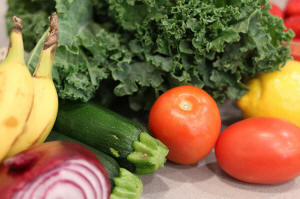Fruitful advice for getting the most from a refrigerator and making
groceries last longer
[November 10, 2025]
By CHEYANNE MUMPHREY
After carefully choosing the freshest produce at the market, people face
even more choices with vegetables, fruit, meat and dairy products at
home that can help prolong freshness, minimize waste and prevent
foodborne illnesses.
There are several methods to store and preserve food, such as canning
and pickling produce, freezing leftover ingredients, and storing food in
the refrigerator. Although refrigeration is effective and most
households have the appliance, experts say it is safe to say most
families simply set it and forget it.
“Storing perishable items in refrigerated conditions is the first step,
but it is necessary to stay aware of how long certain foods have been
prepared, exposed to the air, and stored. Refrigerated items are still
able to develop mold and dangerous microorganisms like listeria,
Salmonella, and E. coli, so consumers must stay alert and take necessary
precautions,” said Emily Hilliard, press secretary for the U.S.
Department of Health and Human Services.
This is especially important during the holiday season, when people buy
more and expect meals to last. Planning recipes, buying less and being
creative with extras and leftovers can help reduce food waste, said
Diane Beckles, professor at the University of California, Davis, who
studies the quality of fruits and vegetables. She said these steps can
also help stretch shopper's budgets, especially with inflation on the
rise and federal food aid under threat as the government shutdown
continues.
Preparing your groceries for refrigeration
Experts say proper food storage starts before groceries even reach a
refrigerator. Buy products before their expiration or “sell by” dates —
which tell stores how long to display their products, and are not safety
dates. Follow handling instructions and place foods in the refrigerator
within two hours of being at room temperature. Other tips include
keeping appliances clean by wiping spills, especially from thawing meat,
and discarding spoiled food. The Department of Energy recommends keeping
refrigerator temperatures between 35-38 degrees Fahrenheit (1.7-3.3
degrees Celsius).

Social media offers seemingly endless tips to make food last longer,
such as cleaning fruits before refrigerating and storing everything in
plastic or glass containers. But experts say there isn't just one right
way to properly store many foods.
It comes down to understanding temperature and relative humidity when
storing produce, said Wyatt Brown, emeritus professor at California
Polytechnic State University in San Luis Obispo. After that, “it becomes
more refined" and includes considerations like storage space, timing of
meals and personal preference.
For Beckles, the most important thing is to eat more fruits and
vegetables — not worrying so much about how they are stored. “I
recommend not storing tomatoes in the fridge, but there are people who
feel better doing so," she said. "It's not going to taste as good, but
if they eat them and get the nutrients, who cares.”
Fruits and vegetables
Most produce, including fruits, vegetables, leafy greens and herbs, is
alive. Experts say refrigerating produce can slow spoilage, if done
correctly. Brown, who studied post-harvest technology and taught for 31
years, said refrigeration can also maintain nutrition and extend shelf
life.
Experts recommend using your fridge’s crisper drawers to separate fruits
and vegetables and control humidity. Keep berries dry and wash them just
before eating. Refrigerate broccoli, carrots, and green beans, and store
leafy greens in plastic or paper bags to prevent wilting.
[to top of second column]
|

Groceries lay on a kitchen counter before being sorted for storage
in the pantry and refrigerator Oct. 25, 2025, in Flagstaff, Ariz.
(AP Photo/Cheyanne Mumphrey)
 Some produce, like tomatoes, pears
and apples, emit ethylene gas as it spoils causing the surrounding
fruits and vegetables to ripen more quickly, so experts say to get
rid of rotting food to keep other items fresh. Onions, garlic,
apples, nectarines, citrus fruits and squash can all be left on the
countertop.
Brown said to consider storing onions and potatoes outside of the
refrigerator to limit roots sprouting from the bulbs. “If you store
potatoes in the refrigerator for a long time, the starch will break
down into sugar, and the Maillard reaction could cause the sugars to
produce dark pigments when cooked,” he said, explaining the reaction
causes dark patches on cooked potatoes.
Proteins, including meats, eggs and beans
Uncooked meat should remain chilled and not left at room temperature
for more than two hours, or one hour if above 90 degrees Fahrenheit
(32 degrees Celsius), federal health agencies say. Avoid thawing
meats on the counter, and marinate in the refrigerator, experts say.
When placed in the refrigerator, meats should be stored at the
bottom to prevent cross-contamination from drips or spills.
Food safety guides from the Food and Drug Administration and the
Department of Agriculture's Food and Nutrition Service suggest
storing eggs on the middle or back shelves rather than the door,
where the temperature is warmer. Avoid washing eggs because it
removes their natural protective outer layer called the bloom.
Unwashed farm-fresh eggs can be stored at room temperature, but
refrigeration extends their shelf life.
Dairy products, milk and cheeses
Milk, yogurt and cheeses should all be refrigerated. Experts say
yogurt is a ready-to-eat product that can be stored on the top
shelves in refrigerators. On the other hand, cheeses should not be
stored on top shelves or the door where air circulation could dry
them out. Experts say soy, coconut and nut milks should also be
refrigerated but, depending on the carton, can be stored at room
temperature until opened.
Breads, grains and rice
The FDA advises against refrigerating bread, as it can dry out and
become stale. However, refrigeration slows mold growth in humid
climates, and freezing preserves quality for up to six months.
Non-perishable foods like rice, pasta, and flour can be stored at
room temperature.

Other
Ready-to-eat meals and leftovers can be stored on the top shelves
for quick and convenient access, while dressings, condiments and
non-dairy drinks can be kept in the door where it is warmer. The
USDA says leftovers can be kept in the refrigerator for 3 to 4 days
or frozen for 3 to 4 months. Alcohol storage depends on the type,
whether it’s opened, and if it contains dairy or fruit. Opened wine
should be refrigerated on its side to slow oxidation and keep the
cork moist.
___
Mumphrey reported from Flagstaff, Arizona.
All contents © copyright 2025 Associated Press. All rights reserved |